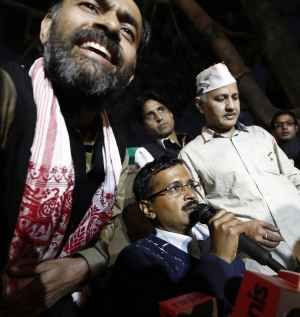 | « Back to article | Print this article |
 Former Delhi Chief Minister Arvind Kejriwal and two other Aam Aadmi Party leaders have been summoned as accused by a court in New Delhi in a criminal defamation complaint filed against them by an advocate.
Former Delhi Chief Minister Arvind Kejriwal and two other Aam Aadmi Party leaders have been summoned as accused by a court in New Delhi in a criminal defamation complaint filed against them by an advocate.
Metropolitan Magistrate Muneesh Garg directed Kejriwal, AAP leaders Manish Sisodia and Yogendra Yadav to appear before it on June 4 in the matter.
"Accused persons namely Arvind Kejriwal, Manish Sisodia and Yogender Yadav are summoned for offence punishable under Sections 499/500/34 (defamation and common intention) of the Indian Penal Code.
“Be listed on June 4, 2014 for appearance of accused persons," the court said on the complaint of advocate Surender Kumar Sharma
"In the totality of facts and circumstances, considering the deposition of complainant and other evidence on record, I find prima facie material to summon the accused persons for offence under Sections 499/500/34 IPC.
"The press release published in newspapers as well as testimonies of witnesses reflect that defamatory remarks were published in the newspaper which affected the reputation of complainant in the society and lowered his reputation in the eyes of other members of the society," the magistrate said.
The court, however, rejected the complainant's plea that AAP leaders had conspired and cheated him, saying in the absence of the very element of deception, there was no prima facie material against any of the accused for the offence of cheating and criminal conspiracy.
The advocate had alleged that in 2013 he was approached by volunteers of AAP who asked him to contest Lok Sabha election on party ticket as Kejriwal was pleased with his social services.
He filled up the application form for contesting on AAP ticket and was later on told by Sisodia and Yadav that the Political Affairs Committee of the party had decided to give him the ticket.
He started his political campaign and incurred expenses of about Rs 5 lakhs on the campaign, the complaint alleged.
The complaint alleged that in September, 2013, the advocate was elected as Chairman of Election Committee of Shahadra Bar Association to conduct polls for the Bar but the elections were disrupted by some disgruntled elements and cancelled. Re-polls were then decided to be held.
On October 14, 2013, the complainant read articles in leading daily newspapers in which "derogatory and defamatory language" was used against him, it said, adding "defamatory, unlawful and derogatory words used by the accused persons as published in the newspapers have lowered the reputation of the complainant in the bar and society".
Sharma claimed due to this his practice was hit and he suffered losses. The advocate also alleged that the AAP leaders had hatched a conspiracy to cheat him and made him incur about Rs 5 lakh over campaign.
The articles had also mentioned that AAP had decided to replace its candidate from the Shahdara constituency, he said.
The articles quoted a party statement saying that it was found that there were criminal cases and FIRs pending against its candidate (complainant) and that in his application, he had failed to mention about it.
While summoning Kejriwal, Sisodia and Yadav, the court said considering the testimonies of witness, press release issued by the accused person in the newspaper, the court was of the considered view that there was prima facie material to summon the accused persons.
"The word 'unfair role played by him during the conduct of election' and words 'doubtful credentials' specifically prima facie show that these contain the imputation which is defamatory in itself and harming the reputation of the complainant adversely, thereby lowering his reputation among the like-minded people of the society," it said.
Image: AAP leader Arvind Kejriwal, Manish Sisodia and Yogendra Yadav
Photograph: Reuters